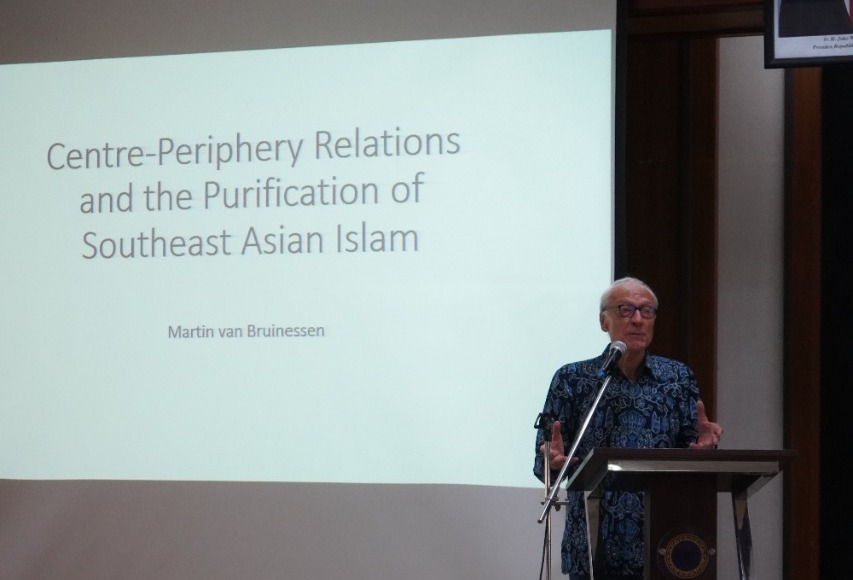UNAIR NEWS – The Faculty of Social and Political Sciences (FISIP) UNAIR held a guest lecture that discussed the topic of “Dynamics of Islam in Indonesia: The Central-Peripheral’s Perspective” on Monday morning, June 13, 2022. The speaker in the guest lecture was a famous anthropologist from Utrecht University, Prof Martin van Bruinessen. Prof. van Bruinessen will use this central-peripheral perspective to explain the Islamic influence of the Middle East, which is central to the development of the religion, on the development of Islam in Indonesia.
According to him, Islamization began in Indonesia during the 13th century, and the Islamic kingdom started to form. In the kingdom, youth elites were sent to Saudi Arabia to learn about Islam. After returning to the kingdom, they would become teachers and religious authorities within their kingdoms.
“However, after the collapse of Islamic kingdoms due to the presence of the Dutch, the central religious authority that previously had resided in the kingdom then moved to pesantren (Islamic school) which is no longer in urban areas but rural or forested areas. This is where the dissemination of Islamic knowledge from Arabia has expanded, and each generation of kyai (Islamic teacher) will carry out a renewal of knowledge,” said the Islamic Studies expert.
Furthermore, Prof van Bruinessen stated that knowledge gained in Arabia was not translated to Arabization then. Islamic culture and practices applied there are often preferred by the natives due to their compatibility with Nusantara culture. As a result, there was acculturation from Islamic practices, Arabian world culture, and Nusantara culture.
“But in the 20th century, a reformist movement began to emerge and sought to ‘purify’ Islamic practices that rejected taqlid (blind following) and acculturation and were guided by the Quran and Hadith. This movement emerged in line with the dissemination of the teachings of Rashid Rida, as well as the emergence of Salafism and Wahabism,” said the professor.
In the end, Prof van Bruinessen explained that reformism was transformed into Islamic internationalism in the Arab World as a form of rejection of Arab nationalism, echoed by Egyptian President Gamal Abdel Nasser. The movement, he continued, was also present in Indonesia through the Indonesian Council of Da’wah Islamiyah (DDII), which was founded by former Indonesian Prime Minister and Masyumi politician M. Natsir.
“DDII focuses its organization as a proselytizing institution that continues the culture of sending its youths to the Arab World. From 1980 to the 90s, many DDII youths adopted Salafism/Wahabism or joined the Muslim Brotherhood organization. After their return to Indonesia and the rolling of the Reformation era, they were the ones who triggered a new wave of Islamic conservativism in formal politics in Indonesia,” he concluded.
Author: Pradnya Wicaksana
Editor: Nuri Hermawan









